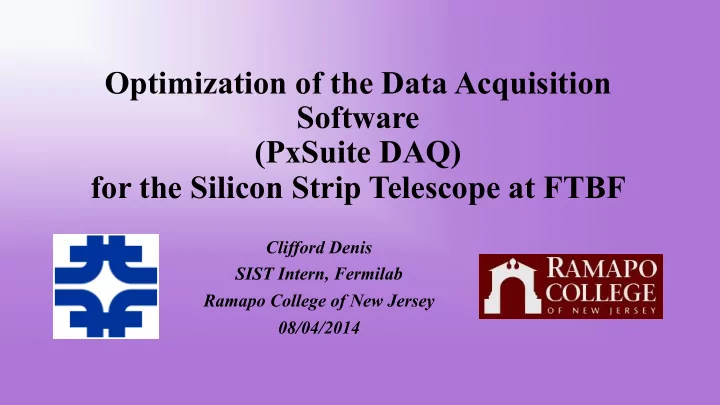

Optimization of the Data Acquisition Software (PxSuite DAQ) for the Silicon Strip Telescope at FTBF Clifford Denis SIST Intern, Fermilab Ramapo College of New Jersey 08/04/2014 ¡
Background What is the Silicon Strip What are the main Telescope? components? Created by the Detector The Silicon Strip Detector Instrumentation Group (DIG) at The CAPTAN Boards (DAQ Fermilab Hardware) Built to track particles’ The PxSuite (DAQ trajectories Software) Used at the Fermilab Test Beam Facility (FTBF) to provide tracking information for different Detectors Under Test
Si-Strip and DAQ layout
The Si-Strip Telescope
The Si-Strip Telescope and DAQ The Strip Station Two strip planes mounted orthogonally A strip plane is made of 639 strips, each 60 microns wide and 9cm long Overlap area of ~4x4cm 2 The CAPTAN Board (DAQ Hardware) C ompact A nd P rogrammable da T a A cquisition N ode Octagon-shaped electronic board designed for acquisition, processing and control of data in High Energy Physics Can be customized connecting other electronic devices (including additional CAPTANs) through the main buses
The Si-Strip Telescope and DAQ Fig. 4 - The CAPTAN Board Fig. 3 - The Strip Station
The PxSuite The PxSuite (DAQ Software) Written in C++, HTML and JavaScript Interface that lets the user program and interact with the hardware through a web-based graphical user interface The Configuration Files Used to configure the telescope and the DAQ hardware Sample actions include: setting the clock source, the clock speed, enabling and disabling strips, setting the threshold sensitivity of the strips
Diagram of the PxSuite DAQ Software
The Issues Accessibility Some parts of PxSuite code not so easy to read Lacking methods to perform direct operations on registers Performance Taking a lot of time to communicate to the hardware
Accessibility Created methods that perform specific operations. Directly modify individual bits of the register STRIP_CSR (setting the BCO clock state, enabling the stream, etc.) Directly set the frequency according to the clock source (External or Internal). Communicate directly with the configuration files, therefore avoiding the need to modify the source code itself (getting the state of the clock from configuration file, etc).
Performance Implemented methods that minimize the response time. Send commands concurrently, therefore reducing the time the program has to wait for an acknowledgment from the hardware. Compare sent and received buffers, making sure they are correctly interpreted. Create a register from the hardware’s acknowledgment while starting data acquisition.
Example of Code
Conclusions and Future Work Conclusions PxSuite code is now easier to read PxSuite performs faster than before Future Work There are more registers to work on, a lot more! PxSuite can probably be made even faster
THANKS!!! Lorenzo Uplegger (Supervisor) Ryan Rivera (Second Supervisor) Kelly Stifter (co-worker) Daniel Parella (co-worker) Fermilab and the SIST committee
Any questions?
Recommend
More recommend